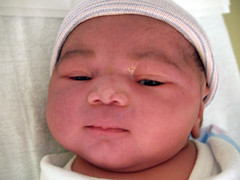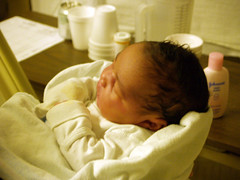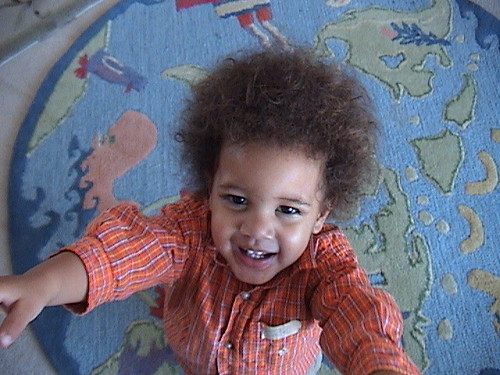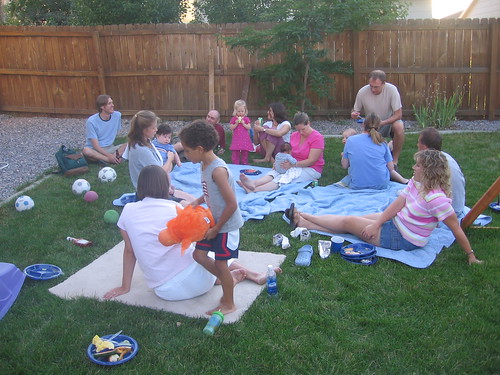"I was born where the weather's forever warm,
... except for the storms ...
Dirty south! Baby, It's sketched on my arm,
Till' death and beyond,
Country like I'm living next to a farm
and war, like we resurrected from 'Nam
I get it from Mom.
Short-tempered, weapon in palm,
Like Malcom X, we study Techs instead of Koran
Who said it was calm?!
We're like the Palestinians and Jews, except for the bombs,
That's why I must address it in song ... "
This is my ode to Hip-Hop and a chance to share a little bit about the lesser known of the three Ogbuji brothers. Above is my favorite quote of his from a song (“Life Begets Evil”) within an a body of work we spent quite some timeon, called "Ahead of My Time." His musical alias is Huck Finn (same as the character in Mark Twain's work). That garage band site, is where I plan to host a few songs from the album.  We worked on it over the winter of 2002, during one of the low points in my life (don't let the smile in that photo fool ya) where I was destitute, boarding with my parents, without employment, and seriously considering (with the state of the economy and all) that I had picked the wrong profession and needed to seek other passions in life.
We worked on it over the winter of 2002, during one of the low points in my life (don't let the smile in that photo fool ya) where I was destitute, boarding with my parents, without employment, and seriously considering (with the state of the economy and all) that I had picked the wrong profession and needed to seek other passions in life.
It was a scattered collection of his thoughts and (in his words basically), the culmination of a 7 year effort to master the art of MCing (moving the crowd - as KRS One puts it). I've often asked Ejike if he has done any significant work since 'Ahead of My Time' and he says he hasn't mostly because as far as he's concerned it was the most complete representation / expression of himself and any further creative attempt would do it a disservice. I can't argue with that because in its essence that's what Hip Hop is, ultimately: a powerful form of expression.
So, I've made a promise to him that some day I'll find the means to get the original work professionally mastered (originally, he recorded the tracks and produced the instrumentals with his microphone and Fruity Loops, while I mixed and mastered them with Acid Pro 4.0), design the cover with the original art we decided on, shrink-wrap it and do some grass roots marketing. I intend to keep my promise someday.
This is my favorite quote because it's a direct reference to a past time in 1997 when he, myself and my two best friends Nnedi Okorafor and Okechukwu Mbachu decided to embark on a road trip to New Orleans. It was there that he and I got tatoos - for different reasons. He got a tatoo that said 'Dirty South Swamp Land' (on his left arm) and I got a tatoo that said 'Umunne Kwenu' (on my upper-forearm). I won't go into the whole politics of tatoos and why some despise them and others abuse them (in my mind), but I mention it because his reference to it is one of the reasons why the above quote resonates with me. In addition, his reference to his birthplace, Gainsville Florida (“where the weather is forever warm – except for the storms”) makes it further hit home, but the icing on the cake is the reference to our mother and her short temper (one which only her sons have been privileged to experience) but few realize exists.
I'm digressing a bit, because as much as I wanted to write about Ejike, I mainly wanted to try to express my love for the art form he tried so hard (and so successfully, IMHO) to perfect: Hip Hop and MCing.
 I was inspired to write this when I recently heard Ice Cube on NPR's 'Fresh Air' and the interview almost brought me to tears. Why? When asked why Hip Hop shouldn't be considered a bad influence for the younger generation and in general, he responded that Hip Hop is about expression and about Ego. He said, for him, it was a healthy way to find a voice to express himself in the very turbulent world he found himself in. I was moved, because in only a few concise sentences, the man (whom my experience with the artform began) completely articulated the essence of the artform. Unfortunately, transcripts are not freely available, but can be purchased
I was inspired to write this when I recently heard Ice Cube on NPR's 'Fresh Air' and the interview almost brought me to tears. Why? When asked why Hip Hop shouldn't be considered a bad influence for the younger generation and in general, he responded that Hip Hop is about expression and about Ego. He said, for him, it was a healthy way to find a voice to express himself in the very turbulent world he found himself in. I was moved, because in only a few concise sentences, the man (whom my experience with the artform began) completely articulated the essence of the artform. Unfortunately, transcripts are not freely available, but can be purchased
You see, when Uche, Ejike, and I were reunited back in 1989 (in East Brunswick, NJ), he had us listen to NWA's album (which marked the beginning of the second renaissance of Hip Hop – the first was triggered by Whodinis Rappers Delight). We stood there, not even teenagers, hit first by the language, but what stuck with us was the powerful expression.
It stayed with all three of us and effected us differently, but it definitely had a permanent effect on us. I tell people all the time that Hip Hop saved my life in High School, and they think I'm overstating the truth, but I'm not. Highschool was a period in my life where the effect of cultural transplantation had a devastating effect of my sense of self worth and identity. I stood out like a sore thumb, visually, culturally, and phonetically. However, in Hip Hop, I found a medium of expression that helped emphasized my individuality and a healthy ego.
There is something about a rhythmic percussion and base, steady vocal cadence, and gritty imagery – peppered with uncensored dialect that simply get's the hair on the back of my head to stand straight up.  I swear, every time I hear Cannibus' (By far my favorite MC) Master Thesis, I get a chill and rewind at least 3-4 times. Why?
I swear, every time I hear Cannibus' (By far my favorite MC) Master Thesis, I get a chill and rewind at least 3-4 times. Why?
Well, I'm not a Christian, but when my rel:lifePartnerOf explained to me the denominational distinctions (within the Christian faith) in whta constitutes the act of speaking in tongues, I felt it was the perfect analogy. As I understand it, one thing that is common to all (or at least most) denominations is that the Holy Spirit resides inside all of us and can manifest itself in a variety of ways – the most prominent being the ability to channel through its host, verbally. I think of the act of MCing (onced honed) as similar. Whereas one is spontaneous, the other takes hard work.
Very hard work. Ejike would spend days on end in the summers, writing in piles of lined notebooks, working on his cadence, delivery, content, intensity. The most useful tool for this (and this is the same for most other MCs) is freestyling.  The concept is well known from the movie 8 Mile, but when you are at the point where you can channel your thoughts and the images that resonate with you directly without much thought for perfecting the delivery or how you may seem to those observing, it's a similar phenomenon. The main difference is that whereas when speaking in tongues the origin is the Holy Spirit, in Hip Hop the origin is the unfiltered combination of ego and self expression. In fact, this analogy is very striking and perhaps not completely coincidental considering the cultural context in which both forms flourish is one and the same.
The concept is well known from the movie 8 Mile, but when you are at the point where you can channel your thoughts and the images that resonate with you directly without much thought for perfecting the delivery or how you may seem to those observing, it's a similar phenomenon. The main difference is that whereas when speaking in tongues the origin is the Holy Spirit, in Hip Hop the origin is the unfiltered combination of ego and self expression. In fact, this analogy is very striking and perhaps not completely coincidental considering the cultural context in which both forms flourish is one and the same.
I've done my own share of honing, and I'm much better than I used to be – no where as good as Ejike, but there is some satisfaction in knowing that if I ever were to come across a Cipher – a group of amateur MC's practicing their delivery with each other – I could hold my own. I would leave feeling like I've connected with people I may not have known or will ever know again through a dialect that's somewhat based on a musical artform, but fused mostly with that part of me that is most unique.
Someday, I'll finish what Ejike and I started in the winter of 2002 and come through on my promise to him to put the finishing touches on the culmination on his effort to master an artform that effected him as much as it did his other two brothers. If not for him, then at least in honor of the artform itself and it's immeasurable value as a means to carve out my identity in a multi-cultural society - one which is but a microcosm of the infinite variety that is our existence on this lonely, rotating sphere.
[Chimezie Ogbuji]









 We worked on it over the winter of 2002, during one of the low points in my life (don't let the smile in that photo fool ya) where I was destitute, boarding with my parents, without employment, and seriously considering (with the state of the economy and all) that I had picked the wrong profession and needed to seek other passions in life.
We worked on it over the winter of 2002, during one of the low points in my life (don't let the smile in that photo fool ya) where I was destitute, boarding with my parents, without employment, and seriously considering (with the state of the economy and all) that I had picked the wrong profession and needed to seek other passions in life. I was inspired to write this when I recently heard
I was inspired to write this when I recently heard  I swear, every time I hear
I swear, every time I hear  The concept is well known from the movie
The concept is well known from the movie 
